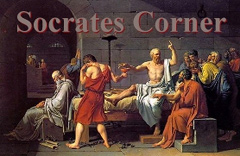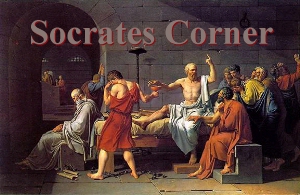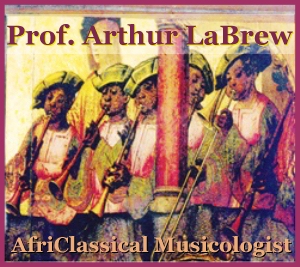On Aristotle and the idea of judgment
*N.B.: This essay is based in part on ideas from Great Books of the Western World, Robert Maynard Hutchins, Editor-in-Chief (1952), Vol. 2, chap. 41 – Judgment and Vol. 8 – Aristotle
“We don’t do punishment [judgment]…. The way that we deal with our kids is, they are responsible for their lives….”
~ Will Smith (actor)
“…I count him braver who overcomes his desires than him who conquers his enemies; for the hardest victory is over self…”
~ Aristotle (384-322 B.C.)
Prologue to Aristotle’s ideas about judgment
The idea of “judgment” has a range of values which comprises three principal options affirming (1) a quality of the mind, (2) a faculty of the mind, and (3) an act of the mind. Of these three ideas of judgment, it is the third which is primarily deliberated in this essay; and it is this meaning of “judgment” which many writers use the word “proposition” to define. Many classical philosophers including – Aristotle, Aquinas, Descartes, Hobbes, Kant, and others oftentimes use “judgment” for “proposition” and vice versa; occasionally they use both words, not as synonyms, but to convey different yet closely related features of the same essential phenomenon.
The idea that judgment as a quality of the mind is the idea in which we usually refer to a person as having good judgment or bad judgment. “We credit the same people,” Aristotle says, “with possessing judgment and having reached years of reason and with having practical wisdom and understanding.” To be “a man of understanding and of good or sympathetic judgment,” he continues, is to be “able to judge about the things with which practical wisdom is concerned.”
The ability to exercise good judgment regarding acts of necessity is frequently associated with the ability to deliberate about the costs and benefits or other conditions related to the action in question. Good judgment may or may not be associated with an ability to resolve thought into action, to move into using the resolution which judgment has formed according to Aristotle. These three qualities of mind – deliberateness, judgment, and decisiveness – are considered by Aristotle and Aquinas as fitting together as quantities of the rational virtue they call “prudence” or “practical wisdom.” The qualities may happen separately, but the judicious man will retain all three.
In the logic of a judicial decision, judgment reflects not so much the equality of the judge’s mind as his duty and authority to adjudicate the case and to have his decision executed by the appropriate officers of the law. This is what is meant by justice. The legal meaning of judgment is not mainly psychological or logical; and, just as the moral concern of judgment is related to discretion, the legal thought is also more correctly established in the context of other ideas.
For instance, the statements: “(Obama) we are the ones we’ve been waiting for” or “all men are mortal” can be understood as stating a judgment or a proposition. In this context then a particular perspective, the choice of understanding is irrelevant; for example, it does not matter whether, in a observation of “(Obama) we are the ones we’ve been waiting for” and “all men are mortal,” the association is stated in terms of universal and particular, affirmative and negative, judgments or propositions, or whether it is said that these are opposing judgments or opposing propositions. The fundamental problems of logic appear to be regarded in the same way by writers like Aristotle and Locke, who have a tendency to use “proposition” instead of “judgment,” and by writers like Aquinas, Descartes, and Kant, who tend to use both words not as synonyms, but with a degree of distinction in meaning.
Philosophers like Aristotle, Aquinas, and Kant, who separate science or philosophy into the theoretical disciplines (e.g., physics, mathematics, metaphysics) and the practical or moral disciplines (e.g., ethics, economics, politics, law), include the dialogue of the distinctions between theoretical and practical judgments in the context of other changes; as, for instance, concerning the speculative and the practical reason, or concerning theoretic and practical knowledge; or in the context of considering the types of truth applicable to each, and the methods of interpretation or demonstration in each. In this sense Aristotle’s judgment idea is predominantly related to Knowledge, Mind, Reasoning, and Truth.
Aristotle: On practical or moral judgments; judgments of good and evil; means and ends
In Topics, Book III, Ch. 2, there is a section about judgment and rules Aristotle discusses in great detail, particularly its underlying features of judgment in relation to the nature of good and evil. On this point, Aristotle writes:
- Another commonplace rule is that what is nearer to the good is better and more desirable, i.e. what more nearly resembles the good: thus justice is better than a just man. Also, that which is more like than another thing to something better than itself, as e.g. some say that Ajax was a better man than Odysseus because he was more like Achilles. An objection may be raised to this that it is not true: for it is quite possible that Ajax did not resemble Achilles more nearly than Odysseus in the points which made Achilles the best of them, and that Odysseus was a good man, though unlike Achilles.
Here, Aristotle’s comparison of heroes is a distinction with a difference. Later Aristotle explains in Topics, Chap. 4 his thesis on judgment and augments it on the subject of “comparison” which in order to make good judgment one must be able to logically compare and distinguish one thing from another. Aristotle writes, “For in some cases in the very course of comparing the things together we at once assert also that each of them, or the one of them, is desirable, e.g. whenever we call the one good ‘by nature’ and the other ‘not by nature’: for clearly what is good by nature is desirable.” While this form of logic is useful, it does have its limits, namely that Aristotle used his ‘by nature’ thesis to validate some people as perpetual slaves and nations of people as perpetual savages or barbarians. History has demonstrated that Aristotle’s worldview on this point wasn’t at all good logic.
In Aristotle’s magnum opus, Metaphysics, the opening paragraph is a transcendent declaration about human nature and the means/ends of moral judgments. Aristotle writes, “All men by nature desire to know. An indication of this is the delight we take in our senses; for even apart from their usefulness they are loved for themselves; and above all others the sense of sight. For not only with a view to action, but even when we are not going to do anything, we prefer seeing (one might say) to everything else. The reason is that this, most of all the senses, makes us know and brings to light many differences between things.”
Finally, in Metaphysics, Book IV, Chap. 4, Aristotle condemns the “doctrine of Anaxagoras” which posits that “contradictory statements are both true” or what we would call in modern times “moral relativism” a favorite tactic of liberals, progressives and the Democrat Socialist Party since the advent of Karl Marx and Charles Darwin in the 1840s and 1850s respectively. According to Aristotle, the doctrine of Anaxagoras holds all “reality” as “indeterminate.” And that the believers of the doctrine of Anaxagoras “Must predicate of every subject the affirmation or the negation of every attribute,” for to think otherwise in Aristotle’s mind is “absurd.” He concludes with this didactic idea, “For if it is true that a thing is a man and a not-man, evidently also it will be neither a man nor a not-man.” And I add this politically incorrect point: Man cannot be man and non-man at the same time. This reminds me of a principle of quantum physics: No two things can occupy the same space at the same time. Why? If you were able to get two objects to occupy the same space at the same time there would be a massive explosion and all the mass of the two objects would be converted to energy (so the theory goes).
Aristotle and Post-enlightenment thinkers
In a 2010 essay I called Aristotle “the father of political conservatism,” however, the great German philosopher and atheist, Friedrich Nietzsche, has been said to have acquired virtually all of his ideas on political philosophy from Aristotle. Though unbelievable as this maybe, it is surely the fact that Aristotle’s rigid separation of action from production, and his defense of the natural inferiority of slaves and other nations to the virtue – or arête – of the oligarchy justified his rigid model of aristocracy. Conversely, it is another German philosopher (and Nazi sympathizer), Martin Heidegger, not Nietzsche, who championed an original interpretation of Aristotle and intended to promote his ideas on the deconstruction of academic and philosophical tradition which ironically today seems to be where the Academy and the education bureaucracy is taking culture and society and vice versa .
Also, Ayn Rand, the founder of objectivist philosophy, ideas which were a precursor to modern political conservatism libertarianism influencing even conservative icons like Ronald Reagan and William Buckley, recognized Aristotle as “the greatest philosopher in history” and mentioned him as a primary influence on shaping her intellectual worldview. (*N.B.: Political scientist, Charles Murray called Rand’s self-assertion to Aristotle as “childish” arguing that her work was equally indebted to John Locke and Friedrich Nietzsche as well. In recent times, philosopher Alasdair MacIntyre, Senior Research Fellow at the Centre for Contemporary Aristotelian Studies in Ethics and Politics (CASEP) at London Metropolitan University, and an Emeritus Professor of Philosophy at the University of Notre Dame, has endeavored to reform what he calls the “Aristotelian tradition” by deconstructing all of Aristotle’s elitist ideas and reshaping them in a way that is accessible to modern minds and expedient in discussing the claims of both liberals (e.g. progressives, socialists) and Nietzscheans (e.g. atheists, anarchists and nihilists).
Epilogue: Aristotle’s judgment of our Modern Age
When Aristotle writes about judgment in such lofty terms as those I quoted in the epigraph at the beginning, “…I count him braver who overcomes his desires than him who conquers his enemies; for the hardest victory is over self…” it demonstrates both a transcendent level of thought uncommon today, as well as a singular statement of truth regarding human nature that is absent in today’s culture and society where “feelings” and “tolerance” are deified and intellectual rigor, e.g. Knowledge, Mind, Reasoning, and Veritas (Truth) are dying remnants of a bygone era. In the early twenty first century the majority of the Academy with its fascist speech codes and ubiquitous cries of “T-O-L-E-R-E-N-C-E” while students holding Christian or conservative ideas and beliefs are treated as second-class citizens and progressive society which puts all the sins of America’s racist history on the back of one man – LA Clipper owner Donald Sterling, allows millions of Americans to feel very smug in their own conceit because he [Sterling] helps to expiate their own hidden racist views, acts and omissions.
Exhibit A: Former Secretary of State, Condoleezza Rice, a very accomplished Black woman including being a Ph.D. scholar in Russian history and a 30-year professor and provost at Stanford University, was recently and unceremoniously rejected by a small gang of about 50 racist, activist students at Rutgers University from being their commencement speaker. The faculty and administration quickly appeased these fascists and withdrew their invitation to Dr. Rice under this so-called “pressure.” Why? Because she is Black and a conservative [albeit a moderate], a combination that the progressive/socialist left possess a venal hatred of to this day.
In conclusion, comparing actor Will Smith’s lazy parenting philosophy and gratuitous idiocy (“We don’t do punishment” [judgment]) to Aristotle’s sublime understanding of human nature by placing the man who has conquered his desires even above legendary Homeric war heroes like Ajax, Achilles and Odysseus, contradicts the pseudo-science mantra dominating academic, intellectual and scientific thought over the past 160 years. Progressives and socialists (both evolution atheists) have now arrogantly and deceitfully postulated the lying judgment that for thousands of years humanity has collectively been evolving upwards to that secular utopia. On the contrary, since the advent and acceptance as science of Darwin’s racist, pseudo-science evolution theory in the early 1860s, mankind has been steadily devolving (morally, socially, culturally, intellectually, and economically) to an apocalyptic dystopia as we foolishly replaced the God of Abraham, Isaac and Jacob with the god of evolution atheism, racism and democide (State sanction genocide or the murder of any person or people by their government).
Aristotle would call these acts “absurd” judgment… and so do I!
Book Notice
It’s been 5 years since publishing my last book and now I’ve published two new volumes – THE PROGRESSIVE REVOLUTION (University Press of America, 2013):
Vol. 1 @ https://rowman.com/ISBN/9780761861102
Vol. 2 @ https://rowman.com/ISBN/9780761861126
However, before the book is officially released to the public I have to place 100 pre-publication orders (50 orders per each volume). I need your help to make this happen ASAP. Please place your order today for volumes 1 & 2. Of course if you can order all 100 copies today, the book will become official tomorrow.
Please circulate this flyer to all your email contacts & Facebook/Twitter followers who may be interested in reading this opus. Thanks in advance to all my friends, associates and colleagues for your valuable support!
Invitation for manuscripts
I am starting a new a program on my blog dedicated to giving young conservatives (ages 14-35) a regular place to display and publish their ideas called Socrates Corner. If you know of any young person who wants to publish their ideas on any subject, have them send their essay manuscripts to my email atewashington@
wnd.com
.
© Ellis Washington
Category: Commentary







